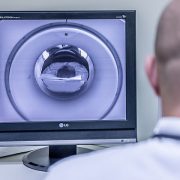Three Easy Tips to Keep your Back from “Going Out”
Three Easy Tips to Keep your Back from “Going Out”
Most people – four out of five to be exact! – will experience a debilitating back pain episode at one point during their lives, and typically we put more effort into caring for our backs during those times than when we’re feeling good. But it’s critical that we take good care of our backs all the time, not just when we’re in pain!
1. Stand Up & Take a Load Off
When we sit for too long, the burden of our weight is placed abnormally on our spine and can cause damage over time. Before long, those small loads add up to real pain. It makes sense when you consider that our bodies were designed to stand, sit, crawl, run, kneel, bend and move through the world in many different ways. It was never designed to sit in one position for prolonged periods, day after day. Sit too long, too often, and it can lead to bulging discs and weak, brittle muscles that are prone to tearing and other damage.
The solution? Limit your sitting to half-hour periods with a few minutes of standing in between, and you’ll reduce the uni-directional forces on your spine. In other words, if you sit for a long time at work or at home, stand up and walk around a little bit every thirty minutes. Aside from participating in regular strengthening exercise, like Pilates, this is the easiest way for the average person to prevent back injury (and heal your back faster if you already have an injury).
2. Watch for Curves
We have natural curves in our spine that help us handle stress and loads. Whether sitting or standing, it’s important to maintain these curves. When standing, our spinal curves occur more naturally and are usually easier to maintain. When we sit, the protective curves in our spine are harder to maintain and often disappear. And while a healthy core and strong back muscles are important to back health, they won’t protect your back if you sit for long periods, or when the curve in your lumbar area disappears while you’re sitting.
Fortunately, the solution is as simple as rolling up a towel and placing it between your chair or car seat and the small of your back (just above the belt line). Using a purpose-designed lumbar roll is my favorite choice, and what I use for low-back support. You can use a lumbar roll in your office chair, car, and on the plane if you’re flying! If you want to learn where you can get on of your own contact us about them here. Or see in more detail how to use them in our free e-book!
3. Extend instead of Bend
The human spine (and entire body) craves balance, which means both extension and flexion. But we spend the majority of our time in flexion, bending over to put shoes and socks on, brushing our teeth, driving, sitting at work and then driving home. At home we bend forward to cook, sit some more as we eat and then curl up on our couch or an easy chair. As long as we’re not gymnasts or circus performers, it’s safe to say we could all use a little more extension in our day.
A really good exercise is to stand and place your hands on your lower back for support and then arch back as far as you can go. Repeat this 10 times, at least once per day. This is also a great activity to do when you are interrupting your sitting during the day. If you’ve never arched you back like this before, it may feel stiff or even hurt a little at first. But, with a gradual increase in frequency, it will feel less stiff and more natural over the course of a few days. If it doesn’t, or becomes troublesome for you, stop and consult with a qualified physical therapist who specializes in back pain.
If you like these tips and want to learn even more ways to prevent debilitating back pain episodes, check out our FREE back pain report right here!
It reveals five easy ways (plus two bonus tips!) that are PROVEN to help you ease back pain quickly – without pain medication, frequent doctor’s visits, or surgery. And don’t forget to check out our Pilates programs if you’re looking for a way to exercise that will target – and resolve – back pain!





